| Article ID | Journal | Published Year | Pages | File Type |
|---|---|---|---|---|
| 2892288 | Artery Research | 2009 | 4 Pages |
SummaryAfrican Americans are more susceptible to develop insulin resistance, obesity, Type 2 diabetes, and coronary heart disease (CHD), and systemic inflammation is central to the pathophysiology of these chronic diseases. African Americans are also more likely to contract H. pylori (cagA) infections during their childhood. However, the contribution of H. pylori infection to the degree of overall systemic inflammation in these chronic diseases is not known. Therefore, we studied 46 apparently healthy African Americans, over 40 years of age who were infected with H. pylori (cagA). These volunteers were assessed at baseline and after treatment with triple regimen drug therapy to eradicate H. pylori. All but 3 subjects were found to be free of this infection by urea breath test (UBT) after the treatment period. No hyperhomocysteinemia was found in these subjects and there were no significant changes in the level of homocysteine (tHcy), folate and B12; however, CRP levels measured by high sensitivity assay showed a significant (p = 0.02) decrease 2 months after the eradication. We further stratified CRP values according to the BMI <27 and >27. There was more profound reduction in CRP in the more obese group (i.e., BMI >27) from 54.26 ± 23.67 to 18.73 ± 17.39 mg/l (p = 0.01), compared with the leaner subjects in whom CRP decreases from 8.88 ± 6.23 to 4.94 ± 6.21 mg/L (p = 0.04), after eradication of the H. pylori (cagA) infection. The level of CRP, however, remained significantly higher in the obese subjects even after the eradication of this infection, indicative of a smaller residual influence of adiposity on CRP. Thus, a major component of systemic inflammation in African Americans may be attributable to chronic H. pylori infection.
